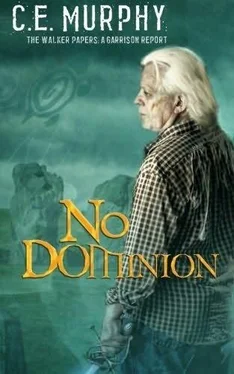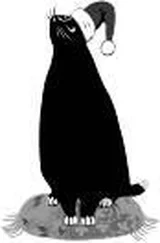I had a grenade launcher.
I wasn’t supposed to, of course. Nobody was, especially since the country-wide crackdown after the election riots when I was seventeen. That was part of why I’d gone into the Army instead of becoming a cop—it had become clear there would be advantages to having friends who worked in military supplies. As a result, the trunk of my Caddy looked like I was preparing for the zombie apocalypse, though from what I understood, zombies were extremely difficult to raise and that threat was negligible. My arsenal was meant for other, more likely scenarios, and the grenade launcher was the least of it.
Most of the grenades I carried were flash-bangs, not frags, but I had lethal capability if I needed it. I also had stun guns, pistols, knives, a garrote, and a slingshot. I’d been surprised at how loud a gun with a silencer was, the first time I shot one. Movies lied. So I’d learned how to use the slingshot for when silence really mattered, and if I thought I would be doing range-hunting, sometimes I took the compound bow out of the trunk too.
Not today, though. I packed grenades, flash-bang and frag alike. I took my space blanket, in case I was out too late and needed warmth. The brand name was something else, but the common name had stuck through the decades, even though a modern space blanket was nothing like the sheet-of-Mylar old ones. Mine didn’t just trap body heat. It absorbed and re-focused solar power, and could be set to release warmth either slowly or quickly. I folded it over my backpack so it would gather heat while I hiked, then slipped my phone’s tiny flat-panel subwoofers into the pack’s outside pockets, muttering, “In case I’m out too late and need a party in my pocket to keep me going.” It sounded like something Joanne would say, which pleased me. I strapped knives to both thighs, slid the stun guns and one pistol into the backpack along with the frags, and shouldered the pack on before sliding my Glock into the custom holster built into the pack’s straps. I put a water bottle on my hip and shook my shoulders, a slosh inside the backpack assuring me the second bottle inside the pack was full, tucked snacks into pockets, and went hiking.
Asag . Sumerian demon of sickness, who, according to my undernet search, made rivers boil with his ugliness and had sex with mountains to make rock-demons to protect himself with. Rock demons and landslides had enough in common to make the link, especially with Marnie’s discomfort about what the kids had reported seeing. The boiling water was a clue, too, even if I couldn’t imagine what a Sumerian demon was doing in the Pacific Northwest. There’d been no reports of unusual sickness in the area, but it was possible he brought sickness, rather than followed it. With boiling rivers and drying-up wells, it was easy enough to see how sickness could come in his wake.
And he’d been defeated by a god in Sumeria. Ninurta, god of sunlight and of healing. I would probably have to wait until Joanne caught up with me to take Asag down, but at least I could locate him on my own.
Marnie had claimed the kids were up at the treeline. I doubted it. Most of the Cascades had a timberline around six thousand feet. Keechelus Lake was just south of Snoqualmie Pass, which was only about three thousand feet above sea level. If the local teens were getting hit by rock slides a couple thousand feet above the mountaintops, I was not only out of my league, but way envious of the flying teenagers.
The terrain wasn’t bad. Low underbrush sprang back after I passed over it. Fir and pine trees provided cover from afternoon sunshine. Birds and squirrels scolded me for intruding on their territory, but weren’t disturbed by anything stranger than me. I wasn’t in the right area yet, in that case. I worked my way up the mountain, switch-backing around a few steep hills covered in huckleberry bushes. Another month and they’d be ripe. On the off chance I had time to go berry-picking, I stopped and recorded the latitude and longitude on my phone. Then I started uphill again, combating mosquitoes until I had to stop again and dig the subwoofers out and hang them on my pack. I couldn’t hear the sonic buzz that vibrated the air in a way that made bugs back off, but I could feel it crawling on my skin. Hikers had been using the tech in lieu of bug spray ever since the sound industry—with some help from the military industrial complex—had turned stereo speakers into something you could roll up or put in a back pocket. They were covered with a solar screen that stored about sixteen hours’ worth of low-level power usage, too, so they could be used as back-up batteries. I vaguely remembered that when I was little—when I’d first met Joanne Walker—cell phones and cameras has to be plugged in, but cars didn’t. Even knowing it had been like that in my lifetime didn’t make it seem any less strange.
There was a rhythm to the climb, a comfortable cadence that clearly let my mind wander. I reset my thoughts toward the data I had available, considering what I knew as I edged upward. Boiling rivers and dried-up pipes weren’t making the news, but there had been a recent story about a proposition to dam the other Yakima River source lakes. I didn’t know if Asag was an opportunistic demon, or the kind someone had to raise, but the threat to the free-flowing sources might tie into the signs of his presence here. All the big US rivers and a lot of the smaller ones were already dammed, and the effects of that were visible in dozens of ways all over the country. An environmentalist with his head on wrong might’ve thought a demon would help solve the watershed problems, but it was just as possible that demons struck where the terrain was inviting. The Cascades offered mountains for mating with, plenty of rivers, lakes, creeks and streams, and enough people that if he survived by making them sick, he’d have a steady diet of illness coming his way.
But it didn’t really matter how he’d gotten here, unless someone had raised him. In that case, capturing him would give me a line back to whoever had done the summoning. If he’d simply spent the past four millennia digging his way through from Sumer and only just made it to Eastern Washington, then all I had to do was bury him again. In another four thousand years he could be someone else’s problem. It wasn’t the kind of solution Joanne would embrace, but I’d made my peace with what I could and couldn’t do. Burying evil worked for me.
I’d climbed high enough on those thoughts that the fir trees had thinned around me. A few sturdy ones still grew higher on the mountain, but I’d reached something close enough to a tree line that I sent a silent apology toward Marnie’s teens. They’d no doubt been up around this level too. I checked my phone, which told me I was at about 2600 feet above sea level. A good day’s hike under ordinary circumstances, but probably nowhere near my destination. Rocks slid beneath my feet and bounced a few yards down the mountainside before settling into new beds. The mosquitoes weren’t so bad this high up, but I left the subwoofers on, just in case. Then I started circling toward narrow waterfall trickles and stream rivulets spilling downhill.
I had a great view of the simmering Keechelus Lake. If my instincts were right about the causality being the demon Asag, he had to be within view of the lake himself, or it wouldn’t be boiling. I didn’t want to think about how many square miles the lake was visible from, because Eastern Washington would be a wasteland before I’d explored them all. But Marnie had said her kids were up on this snub-nosed peak, so that was where I had to start. I gulped down most of a sixteen ounce water bottle and stuck what was left into my pack. I had another larger bottle, too, and an unwise lack of concern about what would happen to my guts if I drank straight from the streams. The way I saw it, they’d probably been boiled recently, and besides, my water bottles had filters that were supposed to clear the bacteria out. I hadn’t gotten sick yet while on mission.
Читать дальше










